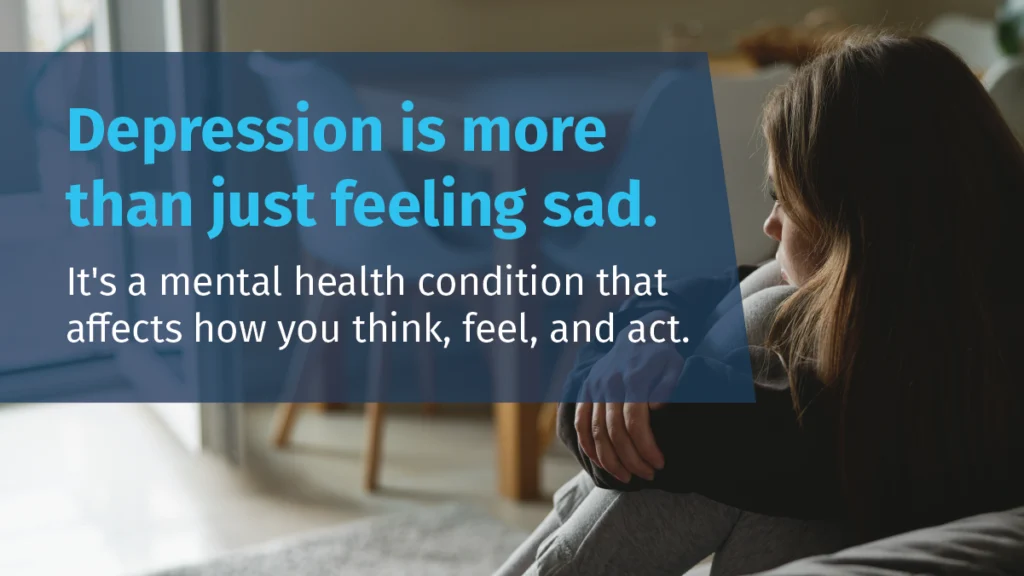Depression is a common yet severe mental health condition that affects how you feel, think, and handle daily activities. It goes beyond feeling sad for a short period. Depression can persist for weeks, months, or even years, significantly impacting your quality of life. Fortunately, depression is treatable with therapy, medications, lifestyle changes, and support from loved ones.
Key Takeaways
Depression can affect daily activities and overall quality of life. Here’s what you need to know:
- Depression can interfere with your ability to function and lead a fulfilling life through different symptoms.
- A combination of different factors can cause depression.
- Diagnosis involves a thorough assessment of symptoms and medical history by a healthcare professional using screening tools.
The Haven Detox-Little Rock offers a supportive environment for individuals seeking comprehensive services for mental health disorders. Call us at (501) 271-3342 to learn more about our programming.
Depression: What is it?

Depression is more than just feeling sad. It’s a mental health condition that affects how you think, feel, and act. It can make everyday tasks seem overwhelming and impact your relationships, work, and overall well-being. Depression can ensue in anyone, regardless of age, gender, or background.
Symptoms of Depression
Depression can mess with your ability to function and lead a fulfilling life. It manifests as:
- Persistent sadness or emptiness
- Disinterest in activities once enjoyed
- Changes in appetite or weight
- Difficulty sleeping or oversleeping
- Fatigue or loss of energy
- Feelings of worthlessness or guilt
- Difficulty concentrating or making decisions
- Restlessness or slowed movements
- Thoughts of death or suicide
Seek professional help if you or someone you know shares these symptoms for an extended period.
Causes and Triggers of Depression
The combination of factors, including genetic, biological, environmental, and psychological influences, causes depression. Traumatic events, chronic stress, certain medical conditions, substance abuse, and hormonal changes can also contribute to depression. Additionally, imbalances in brain chemicals called neurotransmitters, like serotonin and dopamine, play a role in the development of depression.
Types of Depression
There are different types of depression, which include major depressive disorder, persistent depressive disorder (dysthymia), bipolar disorder (manic depression), seasonal affective disorder (SAD), and postpartum depression. Each type has its unique symptoms and triggers.
Seasonal affective disorder usually arises during the winter months when there is slight sunlight, and postpartum depression can occur after childbirth. Treatment for depression varies depending on the type and severity of symptoms but may include therapy, medication, lifestyle shifts, and support from loved ones.
Science Behind Depression
Depression involves complex changes in the brain’s structure and chemistry. These alterations affect mood regulation, behavior, and cognitive function, contributing to the symptoms of depression.
What Happens in the Brain During Depression
In the brain, depression signifies disruptions in the communication between nerve cells and alterations in neurotransmitters such as serotonin, dopamine, and norepinephrine levels.
These chemicals regulate mood, sleep, appetite, and other functions. Structural changes, including shrinkage of specific brain regions involved in emotion processing and regulation, have also been observed in people with depression.
Role of Genetics and Environment
The role of genetics and environment in depression is significant. While major depression can have genetic predispositions, environmental factors such as life events or chronic stressors also play a crucial role. Research suggests that individuals with a family history of depression are at a higher risk, but it’s not solely determined by genetics.
Environmental influences like trauma, abuse, or socioeconomic factors can contribute to the development of depression, particularly in younger people. Understanding these factors can help healthcare providers tailor treatment plans, including therapy, medication, or brain stimulation therapies, to address both genetic and environmental influences on depression.
Impact of Depression
Depression can have severe effects on various aspects of a person’s life, including relationships, work, and overall well-being. It can lead to social withdrawal, decreased productivity, and impaired functioning in daily activities.
Depression and Mental Health
Depression is closely linked to other mental health conditions. Individuals with depression often experience symptoms such as anxiety, irritability, and low self-esteem.
If the depression is left untreated, it can worsen these symptoms and lead to more severe mental health issues. Additionally, depression can impact cognitive function, including memory, concentration, and decision-making abilities.
Physical Consequences of Depression
Depression can also take a severe toll on physical health. Chronic stress associated with depression can weaken the immune system, making people more exposed to infections and illnesses. It can also change appetite and sleep patterns, resulting in weight gain, loss, and fatigue.
Moreover, depression is linked with an increased risk of forging chronic medical conditions such as heart disease, diabetes, and chronic pain syndromes. Addressing the mental and physical aspects of depression is essential for overall health and well-being.
Diagnosing Depression
Diagnosing depression involves thoroughly assessing symptoms and medical history by a doctor or healthcare professional (primary care physician, psychiatrist, or psychologist). It’s essential to rule out other medical conditions that may mimic depression symptoms, such as thyroid disorders or vitamin deficiencies.
Process of Diagnosis
The process of diagnosing depression begins with a physical examination and discussion of symptoms. Healthcare providers may use standardized questionnaires or screening tools to consider the severity of depression symptoms and their impact on daily functioning. They may also conduct laboratory tests, such as blood tests, to rule out underlying medical conditions.
Depression Tests and Assessments
Several standardized tests and assessments are available to help diagnose depression and assess its severity. One commonly used tool is the Patient Health Questionnaire-9 (PHQ-9), which evaluates nine critical symptoms of depression based on the criteria from the Diagnostic and Statistical Manual of Mental Disorders (DSM-5).
Other assessments, such as the beck depression inventory (BDI) and the Hamilton Rating Scale for Depression (HAM-D), may also be used to measure the severity of depression symptoms and track treatment progress. These tests provide helpful information for healthcare providers to set personalized treatment plans for individuals with depression.
Treatment Options for Depression
There are various treatment options available for depression, including psychotherapy, medication, alternative treatments, and lifestyle changes. These approaches aim to alleviate symptoms, improve mental health with coping skills, and enhance overall well-being.
Psychotherapy
Psychotherapy, also known as talk therapy, involves meeting with a trained therapist to discuss and work through issues contributing to depression. Different types of psychotherapy, such as cognitive behavioral therapy (CBT), interpersonal therapy (IPT), and psychodynamic therapy, may help individuals understand their thoughts, emotions, and behaviors and develop healthier coping mechanisms.
Medication and Drug Therapy
Medication, such as antidepressants, may be prescribed to help manage depression symptoms in older adults. These medicines work by restoring the balance of neurotransmitters in the brain.
Common types of antidepressants include selective serotonin reuptake inhibitors (SSRIs), serotonin-norepinephrine reuptake inhibitors (SNRIs), and tricyclic antidepressants (TCAs). Working closely with a healthcare provider is vital to find the best medication and dosage for each individual.
Alternative Treatments
To traditional therapy and medication, some people may benefit from alternative treatments for depression, such as acupuncture, yoga, mindfulness meditation, and herbal supplements. While these approaches may help alleviate symptoms for some people, more research is needed to determine their effectiveness as standalone treatments for depression.
Living with Depression
Living with depression can be tricky, but there are ways to address symptoms and improve quality of life. Regular physical activity, keeping a healthy diet, getting enough sleep, and dodging alcohol and drugs can all help support mental health and well-being.
Coping Strategies: Learning effective coping tactics, such as relaxation techniques, stress management, and problem-solving skills, can help individuals better manage stressors. These strategies cope with depression symptoms when they arise.
Lifestyle Changes: Make positive lifestyle changes. Establishing a routine, setting realistic goals, building a support network, and amusing wellness activities that bring joy and fulfillment can contribute to long-term recovery and resilience in living with depression.
Depression and Relationships
Depression can significantly impact relationships, as individuals may struggle to express themselves or engage with loved ones due to symptoms like low mood and withdrawal. This strain can affect both partners’ mental well-being and lead to conflicts or misunderstandings.
Seeking support from mental health professionals or attending couples therapy can help navigate these challenges and strengthen communication and understanding within the relationship.
Both partners must recognize the impact of depression and work together to support each other through treatment and recovery.
Impact of Depression on Relationships
Depression can strain relationships by causing emotional distance and misunderstandings. Individuals with clinical depression may struggle to engage with loved ones, impacting communication and intimacy. This strain can worsen symptoms and hinder recovery. Effective treatments like therapy and medication can help manage symptoms, improving relationship dynamics.
However, treatment-resistant depression may require alternative approaches such as electroconvulsive therapy or transcranial magnetic stimulation. Support from healthcare providers and loved ones is crucial for navigating these challenges.
Support for Loved Ones
Support for loved ones of individuals with depression is crucial for their well-being. Encouraging them to seek medical help from doctors or mental health professionals is vital to ensure recovery. Providing emotional support and understanding can help alleviate feelings of isolation and despair. Connecting them with resources such as support groups or online communities can offer additional support.
It’s essential to educate oneself about severe depression and its treatments, as well as to provide patience and non-judgmental support through therapy. Remember, supporting loved ones through their journey with depression can make a significant difference in their recovery and overall quality of life.
Frequently Asked Questions (FAQ)
How do you cope with depression?
Individuals cope with depression by seeking support from healthcare providers (doctors or mental health experts). They may undergo therapy, medication, or other effective treatments, including electroconvulsive therapy or transcranial magnetic stimulation.
Engaging in self-help strategies, such as maintaining a healthy lifestyle, practicing relaxation techniques, and participating in support groups, can also be beneficial. It’s essential to recognize risk factors and possible causes of depression while also fostering social support from family and friends. By creating a treatment plan and accessing resources, individuals can effectively manage depression and improve their quality of life.
What are the leading causes of depression?
Depression is a common mood disorder marked by constant emotions of sadness and loss of interest in activities. Its leading causes include genetic, biological, environmental, and psychological factors. While there isn’t a single cause of depression, certain risk factors such as life events, family history, and substance use disorders can increase vulnerability.
Effective treatments like therapy and antidepressant medication are available for people of all ages. Seeking support from healthcare providers, family members, and support groups is essential in managing depression and improving overall well-being.
Revitalize Your Life at The Haven Detox-Little Rock
At The Haven Detox-Little Rock, we redefine mental health treatment with compassion and expertise.
Our residential program offers a sanctuary for individuals battling mental health challenges. Through medication-assisted treatment, we address the complexities of mental illness, providing tailored solutions for holistic healing. We empower our patients to reclaim their well-being and thrive by focusing on individualized care and evidence-based approaches to mental health treatment.
Call us at (501) 271-3342 to learn more about our mental health programs.





